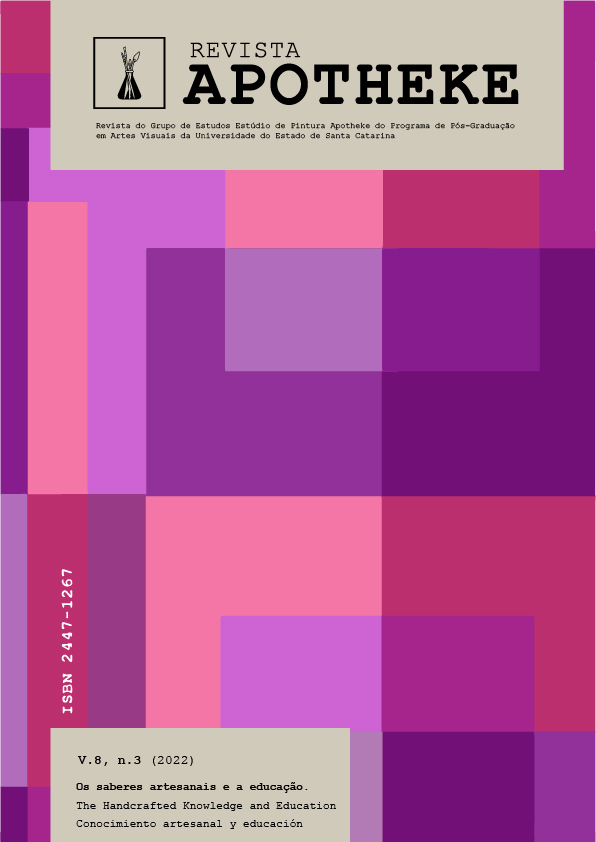Coleção de bordados: cartografia de uma residência de arte contemporânea com mulheres bordadeiras no Pampa argentino
DOI:
https://doi.org/10.5965/24471267832022037Palavras-chave:
Artes Têxteis, Gênero, Processos Sociais, América LatinaResumo
O artigo aborda o processo de investigação e prática artística que se deu a partir dos encontros com grupos de mulheres nas oficinas de costura e de bordado de Bayauca, comunidade rural próxima à cidade de Lincoln, Buenos Aires, Argentina, durante a Segunda Edição da Residência Internacional COMUNITARIA, Arte Contemporáneo y Procesos Sociales, que aconteceu durante o mês de novembro de 2017. Utilizamos o bordado para formar uma imagem poética do nosso trabalho autoral durante essa investigação e como referência para reflexões sobre a construção e desconstrução de expectativas criadas na sociedade e entre as próprias mulheres sobre arte e gênero. Imaginamos uma força performática a partir do pensamento de Gilles Deleuze e Felix Guattari (1995) que agencia os percursos e movimentos que resgatam histórias da residência, que colocamos em perspectiva a partir dos estudos feministas e sobre as relações entre arte e gênero na América Latina. Partimos da ideia de artista nômade, de Cristina Freire (2006) e do argumento desenvolvido por Sepúlveda T. e Bustos (2017) de que a arte é uma ferramenta para a ação política quando se pauta num sistema horizontal de relações baseadas na atenção, nos encontros, nas histórias e nos espaços alternativos de escuta e de ações concretas. Por fim, mostraremos que a expressividade do bordado, ao mesmo tempo em que serve como veículo de um sistema de educação moralizante, pode ser usado como veículo de comunicação e espaço criativo e de reflexão sobre a condição política, contestando hierarquias sociais e estéticas impostas e apontando para dinâmicas sociais emergentes na América Latina.
Downloads
Referências
BARROS, Laura Pozzana de; KASTRUP, Virgínia. Cartografar é acompanhar processos. In: PASSOS, Eduardo; KASTRUP, Virgínia; ESCOSSIA, Liliana. Pistas do método da Cartografia. Porto Alegre: Sulina, 2009.
BIAZUS, Camilla Baldicera. Da mãe-aranha à mãe-costureira: as formas e movimentos da maternidade na obra de Louise Bourgeois. Ide (São Paulo) [online]. 2020, vol.42, n.70. Disponível em: http://pepsic.bvsalud.org/scielo.php?script=sci_arttext&pid=S0101-31062020000200011&lng=pt&nrm=iso Acesso: 08/05/2022.
BUTLER, Judith. Problemas de Gênero: feminismo e subversão da identidade (tradução de Renato Aguiar). 16ª ed. Rio de Janeiro: Civilização Brasileira, 2018.
CATÁLOGO DE EXPOSIÇÃO. Transbordar: transgressões do bordado na arte. (Curadora Ana Paula Cavalcanti Simioni) - São Paulo: Sescsp, 2020.
FEDERICI, Silvia. Mulheres e caça às bruxas: da Idade Média aos dias atuais. Trad. Heci Regina Candiani, São Paulo: Boitempo, 2019.
FREIRE, Cristina. Contexturas: Sobre artistas e antropólogos. Texto do Catálogo da 27ª Bienal de São Paulo, Fundação Bienal, 2006.
FREIRE, Paulo. Extensão ou comunicação? 10. ed. Rio de Janeiro: Paz e Terra, 1994.
GEHRKE, Laura Clara. Bordando Feminismos: uma questão de gênero. (Trabalho de Conclusão de Curso (Graduação) – Universidade Federal deo Rio Grande do Sul, Instituto de Artes, Curso de História da Arte, Porto Alegre, RS, 2021. Disponível em: https://www.lume.ufrgs.br/bitstream/handle/10183/223169/001127778.pdf?sequence=1&isAllowed=y Acesso: 07/01/2022.
DELEUZE, Gilles e GUATTARI, Felix. Mil platôs: capitalismo e esquizofrenia (volume 1). - São Paulo: Editora 34, 1995.
GLUZMAN, Georgina. El trabajo recompensado: mujeres, artes y movimentos femininos em la Buenos Aires de entresiglos. In: Numéro 5.Artelogie, nº 5, Octubre, 2013. Disponível em: http://cral.in2p3.fr/artelogie/IMG/article_PDF/article_a265.pdf Acesso em: 15/10/2018.
GUIMARÃES, Mariana. Bordadura como linguagem de experiências, afeto, vínculo e liberdade. 24º Encontro da ANPAP: Compartilhamentos na Arte, Redes e Conexões. Santa Maria, Rio Grande do Sul, 2015. Disponível em: http://anpap.org.br/anais/2015/simposios/s12/mariana_guimaraes.pdf Acesso em: 30/07/2019.
NOGUEIRA, Cláudia Mazzei. A feminização do mundo do trabalho: entre a emancipação e a precarização. Campinas, SP: Autores Associados, 2004. Disponível em: https://tede2.pucsp.br/handle/handle/17846 Acesso em: 02/05/2019.
PELLEGRINO, Antônia. Sobre mulheres em motocicletas roxas. Memórias do Feminismo dos anos 1960-70. Revista Quatro cinco um. Maio de 2017.
SEPÚLVEDA T., Jorge. Comunitaria: experiencias de arte y comunidad. 1.a edición bilíngue – Santa María de Punilla: Curatoria Forense, 2017.SEPÚLVEDA T. et al. Incerteza e Interpelación/ção. 1.a edição bilíngue – Córdoba: Curatoria Forense, 2022.
TIBURI, Marcia. Feminismo em comum: para todas, todes e todos. 4ª ed. Rio de Janeiro: Rosa dos Tempos, 2018.
Downloads
Publicado
Como Citar
Edição
Seção
Licença
Copyright (c) 2022 Adriene Coelho Ferreira Jerozolimski, Maristani Polidori Zamperetti

Este trabalho está licenciado sob uma licença Creative Commons Attribution-NonCommercial 4.0 International License.
Os autores de trabalhos submetidos à Revista APOTHEKE autorizam sua publicação em meio físico e eletrônico, unicamente para fins acadêmicos, podendo ser reproduzidos desde que citada a fonte. Os mesmos, atestam sua originalidade, autoria e ineditismo.
Os artigos publicados pela revista são de uso gratuito, destinados a aplicações
acadêmicas e não comerciais. Os direitos autorais são todos cedidos à revista. Os artigos cujos autores são identificados representam a expressão do ponto de vista de seus autores e não a posição oficial da Revista Apotheke. O(s) autor(es) se compromete(m) a sempre que publicar material referente ao artigo publicado na Revista Apotheke mencionar a referida publicação da seguinte forma:
"Este artigo foi publicado originalmente pela revista Apotheke em seu volume (colocar o volume), número (colocar o número) no ano de (colocar o ano) e pode ser acessado em: http://www.revistas.udesc.br/index.php/APOTHEKE/index"
É responsabilidade dos autores a obtenção da permissão por escrito para usar em seus artigos materiais protegidos pela Lei de Direitos Autorais. A revista Apotheke não é responsável por quebras de direitos autorais feitas por seus colaboradores.
Os autores mantêm os direitos autorais e concedem à revista o direito de primeira publicação, com o trabalho licenciado sob Licença Creative Commons do tipo atribuição BY-NC:
Atribuição (BY): os licenciados têm o direito de copiar, distribuir, exibir e executar a obra e fazer trabalhos derivados dela, conquanto que deem créditos devidos ao autor ou licenciador, na maneira especificada por estes.
Uso Não comercial (NC): os licenciados podem copiar, distribuir, exibir e executar a obra e fazer trabalhos derivados dela, desde que sejam para fins não comerciais.
Após a publicação dos artigos, os autores permanecem com os direitos autorais e de republicação do texto.




